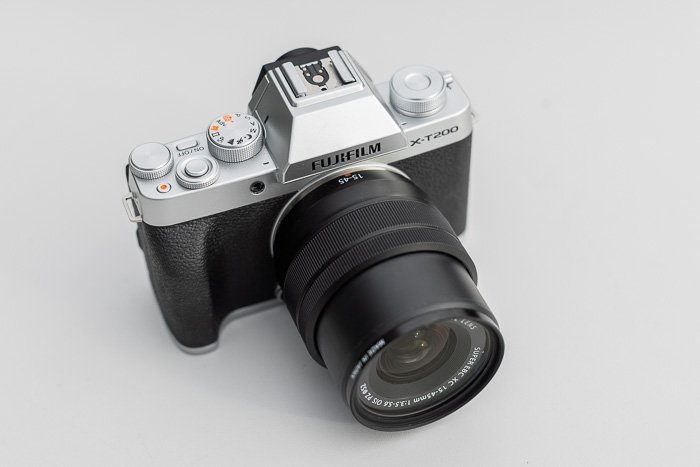Finding the best gear for landscape photography is as simple or complex as you want to make it. That’s because you can take amazing landscape photos with the most basic of equipment. And the chances are you have a smartphone that will do very well in many circumstances.
On the other hand, there are cameras and other bits of gear that can take your landscape photography to the next level. We’re going to look at a whole range of photography gear to help you improve your landscape photography. From cameras to tripods to backpacks, we’ve got you covered.
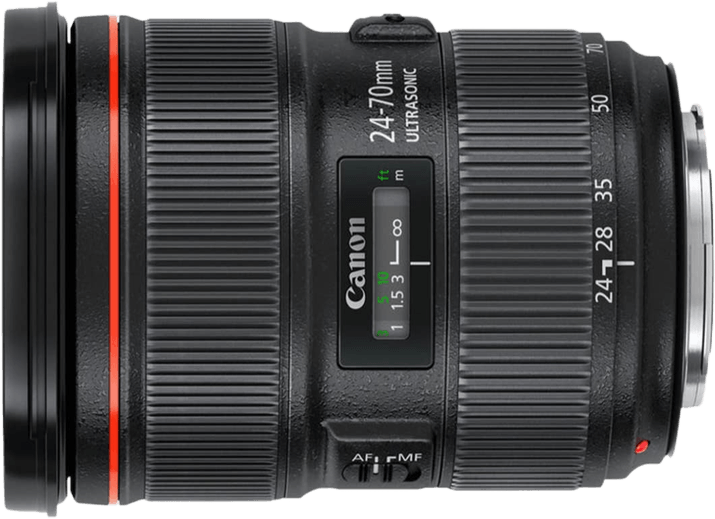
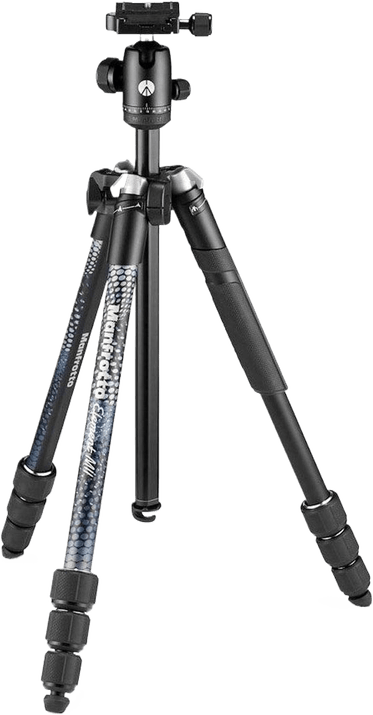
The Best Landscape Photography Gear
We’ll begin our review with the best camera for landscape photography. Then we’ll move on to look at the other kit you might need and want.
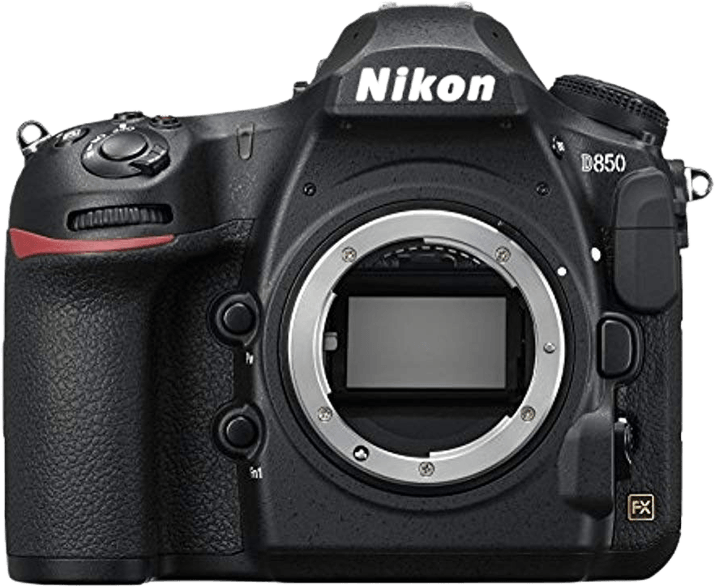


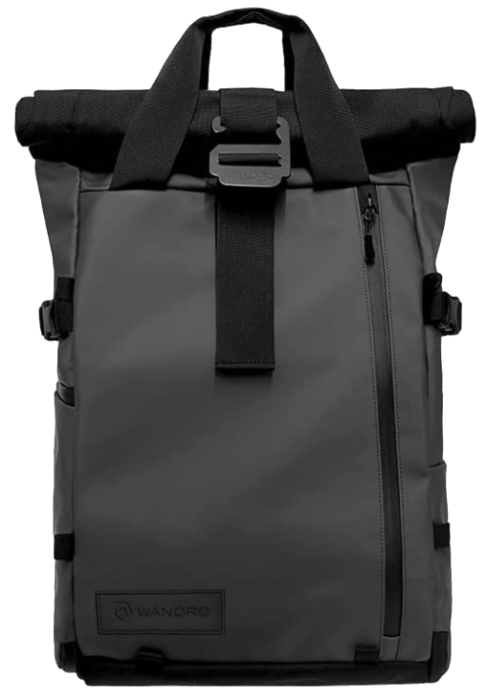
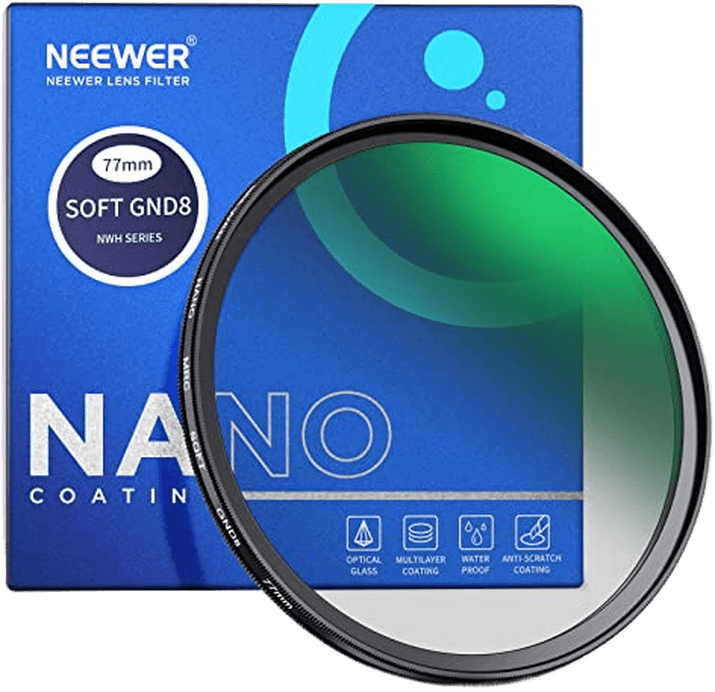
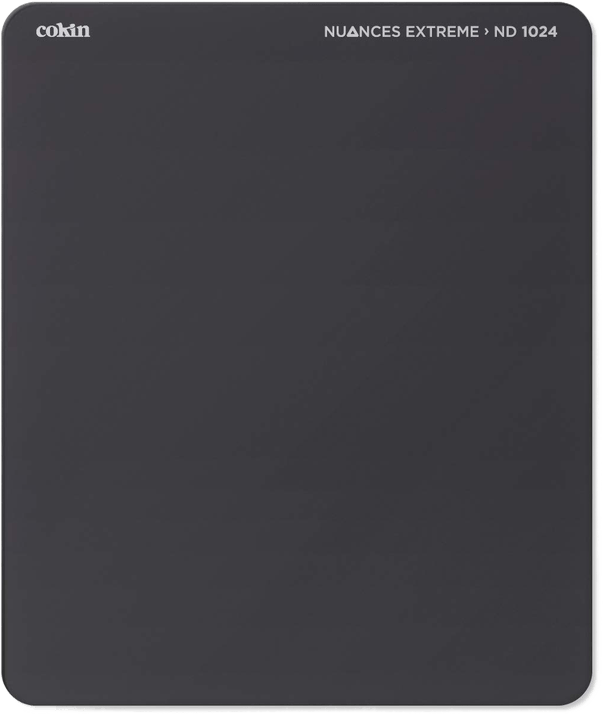
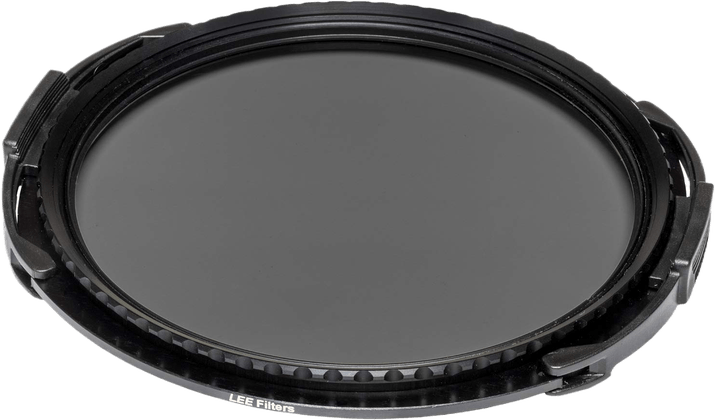


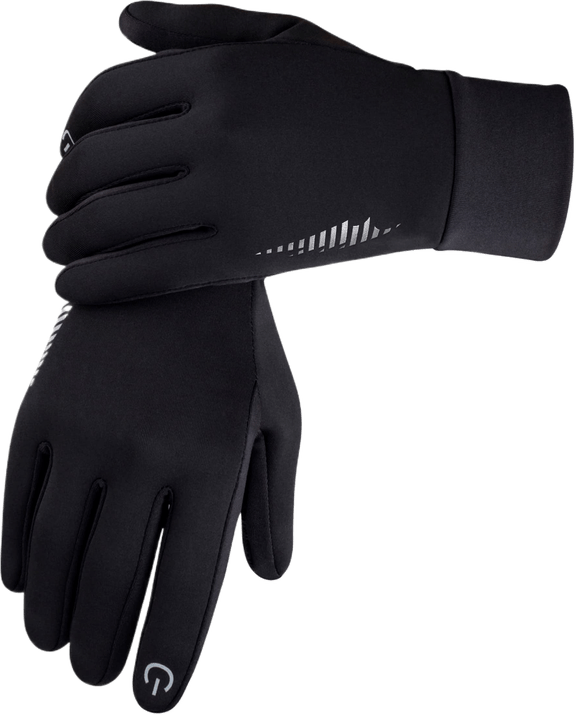
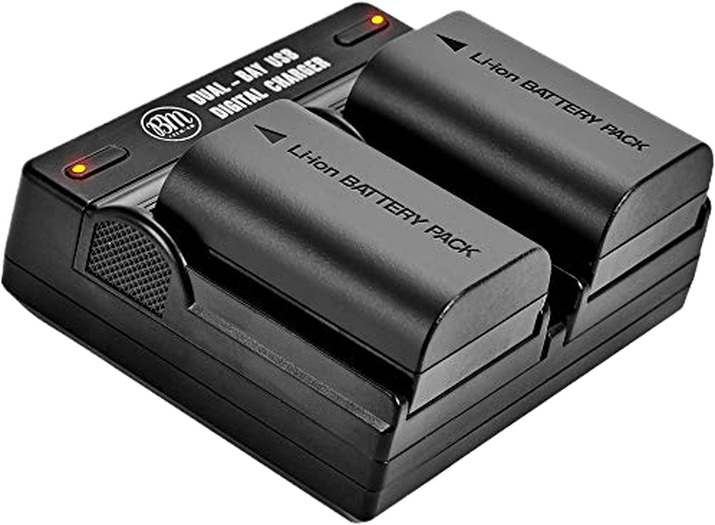
The Best Camera for Landscape Photography
1. Nikon D850

| Sensor Format |
Sensor Format
|
| Lens Mount |
Lens Mount
Nikon F FX
|
| Megapixels |
Megapixels
45.7 MP |
| In-body Stabilization |
In-body Stabilization
|
| Autofocus Points |
Autofocus Points
153 |
| Maximum ISO (Native) |
Maximum ISO (Native)
25,600 |
| Frame Rate |
Frame Rate
7 fps |
| Video |
Video
|
| Screen Size |
Screen Size
|
The best camera for landscape photography will need to meet the following criteria:
- High image resolution
- Wide dynamic range
- Good ISO range
- Live view display
- Weather sealed
- Good battery life
One camera that catches the eye in all these areas is the Nikon D850. It’s an outstanding camera for a whole range of uses. And it is particularly suited to landscape photography. The D850 is one of Nikon’s finest DSLRs ever made. It has a 45.7 MP full-frame sensor. There’s little (other than medium format) that can stand up to a full-frame camera for landscape photography. This level of detail makes an incredible difference.
A full-frame sensor also helps with dynamic range. A landscape might include both a bright sky and sunlight, and darker shadows. Exposure bracketing for a high dynamic range (HDR) photo won’t always help with this. Clouds, leaves, and wildlife are likely to move in between exposures. It’s much better to have a camera that has a great deal of dynamic range to start with. The D850 happily meets this criterion.
A camera and lens that have good weather sealing will help protect your precious and expensive gear. And the D850 has durable weather sealing for outdoor shoots in any weather conditions.
The last thing you want after hauling your gear all the way out to your location is to run out of battery. And there won’t be any outlets in the field. It’s always good to carry a spare, but the longer your battery lasts, the better. The D850 has excellent battery life that will provide hours of shooting.
The D850 also has a useful time-lapse feature, making 4K videos a breeze. Getting the exposure right on lengthy time-lapses can be tricky. So this is a handy feature. Another aspect that landscape photographers will appreciate is the minimum ISO of 64. This can really help in very bright situations.
In recent years, you’ll have noticed that mirrorless cameras are taking over from DSLRs in almost every price bracket. If you want to see a range of the best cameras for landscape photography, then we’ve collected the best for every budget and purpose. If cost is your main consideration, look at the best budget cameras for landscape photography to help you choose.
The Best Lens for Landscape Photography
2. Canon EF 24-70mm f/2.8L II USM

| Brand |
Brand
Canon
|
| Maximum Aperture |
Maximum Aperture
f/ 2.8
|
| Focal Length Range |
Focal Length Range
24-70 mm
|
| Image Stabilization |
Image Stabilization
|
| Lens Mount |
Lens Mount
Canon EF
|
The next most important item on your list is the lens. The Canon EF 24-70mm f/2.8L II USM is a superb lens for many situations. And landscape photography is one of them.
It’s loved by photographers and is often on the top of the list of “best lenses,” and for good reason. The 24-70mm focal length is very handy. And the f/2.8 constant maximum aperture is great for low light. There are ultra- and super-low dispersion elements that help prevent chromatic aberration.
If you’re not a full-frame Canon user, we have a review of the best lenses for landscape photography. It will help you decide what’s the best choice for you.
The Best Tripod for Landscape Photography
3. Manfrotto Element MII Tripod

| Brand |
Brand
Manfrotto
|
| Material |
Material
Aluminum
|
| Tripod Weight |
Tripod Weight
3.3 lbs / 1.5 kg
|
| Max Height |
Max Height
63 inches / 160 cm
|
| Folded Height |
Folded Height
16.7 inches / 42.4 cm
|
| Max Load Capacity |
Max Load Capacity
17.6 lbs / 8 kg
|
The Manfrotto Element MII Tripod is an impressive blend of stability and lightness. It will easily handle full-frame DSLRs, given its 17.6 lbs/8kg maximum capacity. Keeping your tripod level is always important. And it can be tricky on uneven ground. You can adjust the angle and length of each leg individually, making it easy to keep it level wherever you’re shooting.
It has other great features you’ll want in a tripod for landscape photography. There is a hook on the center column to help stabilize the tripod, especially if it’s windy. You can hang your backpack on this hook to add a stabilizing weight.
You might find your location puts one tripod leg on a rocky surface and others on wet grass. In this case, rubber feet help to grip the rock. And retractable spikes dig into the soft ground.
Sometimes the best angle is low to the ground. Conventional tripods are often unsuited to that. The Element MII has a removable center column. This lets you invert the column and lets you shoot from ground level, all without your camera touching the ground.
We’ve got a great article for choosing the best tripod for landscape photography. You’ll find a great range of tripods to suit every budget!
The Best Backpack for Landscape Photography
4. Wandrd Prvke Camera Backpack

| Weight |
Weight
1300 g
|
| Capacity |
Capacity
21 L
|
| Access Points |
Access Points
Back, side, top
|
| Airflow Back Support |
Airflow Back Support
Yes, with mesh
|
| Laptop Sleeve Capacity |
Laptop Sleeve Capacity
15-inch
|
| Tripod Holder |
Tripod Holder
|
| Warranty |
Warranty
Lifetime
|
| Waterproof Rating |
Waterproof Rating
Weather-resistant
|
Now that you’ve got your camera, lens, and tripod, you’ll need to carry everything. And our top pick is the Wandrd Prvke. It’s lightweight and has plenty of carrying capacity, good weather protection, and can carry a tripod easily. The Wandrd Prvke scored the highest out of all the camera backpacks we reviewed.
You might need a bigger backpack to haul a lot of gear for your landscape photography shoot. In that case, then my choice would be the Manfrotto PRO Light Multiloader. It has amazing capacity and can carry up to three tripods or lighting stands. It even has a reversible waterproof/UV cover to protect your gear.
What backpack you choose will depend on your needs, of course. And because you’ll be walking into the wilderness, you’ll want a lightweight selection of the best backpacks for hiking.
The Best Filters for Landscape Photography
There are three types of filters that are specifically recommended for landscape photography: graduated neutral density (GND) filters, neutral density (ND) filters, and circular polarizing (CPL) filters. Let’s look at each one.
The Best Graduated Neutral Density Filter
5. Neewer HD Soft Gradient ND Filter

| Brand |
Brand
NEEWER
|
| Filter Size |
Filter Size
77mm
|
| Other Available Sizes |
Other Available Sizes
49mm, 52mm, 55mm, 58mm, 62mm, 67mm, 72mm, 82mm
|
| ND Factor |
ND Factor
ND 8
|
| Key Features |
Key Features
Nano coating, water-repellent, aluminum frame
|
Even with a high dynamic range, a camera can struggle to capture very large exposure differences in a landscape. Very bright sun and skies combined with darker land are an exposure nightmare.
One way to compensate for this is with a GND. Unlike a normal ND filter, a GND is only darkened on one-half of the surface area. This allows you to expose both the sky and land correctly.
The Neewer HD Soft Gradient ND Filter is a great value filter. It’s not the cheapest. But you don’t want to compromise on quality when the filter literally sits between the landscape and your lens.
The Neewer is light and slim. Its rim is aluminum alloy, and the glass has a special nano-coating. This coating both protects the glass and helps reduce lens flare and ghosting.
It provides three stops of exposure difference, and the edge between the dark and clear sections has a soft transition. This removes any harsh edge to the effect.
We’ve reviewed a range of graduated neutral density filters in case the Neewer isn’t quite right for you.
The Best Neutral Density Filters
6. Cokin Nuances Extreme ND 10-stop Filter

| Brand |
Brand
Cokin
|
| Filter Type |
Filter Type
Square
|
| Size |
Size
84 x 100mm
|
| Available Densities |
Available Densities
10-stop
|
| Key Features |
Key Features
Tempered optical glass
|
If the light is too bright, we can increase the shutter speed and/or choose a smaller aperture. Or we can lower the ISO setting. But there are situations when this strategy won’t work.
If you stop down your lens beyond f/8, you start to lose sharpness in most cases. This is caused by diffraction in the lens body. And if you want to use a slow shutter speed for some effect, you will run into trouble on a bright day.
This is the situation that an ND filter can help with. It makes the whole scene darker without affecting color or contrast. So you can adjust the exposure to get the effect you want.
The Cokin Nuances Extreme ND is a great choice. The Cokin filter system was groundbreaking back in the day. It allowed photographers to use one filter across a range of lenses. All you needed was the filter, the holder, and a mounting ring for each of your lenses.
This filter comes in two densities, allowing either a 6- or 10-stop exposure change. It’s made out of tempered optical glass, making it strong and durable. And that’s very handy for the landscape photographer.
If you need a different filter, we’ve put together a review of the best ND filters to help you choose which is best for you.
The Best Polarizing Filter
7. Lee Filters LEE100 Polarizer

| Brand |
Brand
Lee Filters
|
| Fitting Type |
Fitting Type
Slot-in
|
| Multicoating |
Multicoating
Yes
|
| Key Features |
Key Features
Fits the Lee 100 holder
|
A CPL will remove glare on bright days, giving water and sky a deeper blue. The Lee100 Polarizer mounted on the Lee100 filter holder is a top-quality product. The glass is high transmission and imparts a slightly warm tone to your photos.
The Lee filter is not the cheapest, but it has a very good reputation for quality. If you need a different one, here are our recommendations for the best polarizing filters.
The Best Shutter Release Accessories
8. Canon BR-E1 Remote Control

| Brand |
Brand
Canon
|
| Brand Compatibility |
Brand Compatibility
Canon
|
| Camera Compatibility |
Camera Compatibility
PowerShot G7 X range, EOS M series, EOS R series cameras
|
| Connectivity Type |
Connectivity Type
Bluetooth
|
| Connection Range |
Connection Range
16 ft / 5 m
|
| Functionality |
Functionality
Shutter release
|
| Key Features |
Key Features
AF button
|
Even when your camera is securely mounted on a sturdy tripod, there is still a risk of camera shake. That’s because the act of pressing the shutter release can easily jolt the camera. A remote shutter release takes away that fear.
The Canon BR-E1 is one of the best camera remotes you can get. It’s compact, effective, and reliable. There are other wireless and wired options out there, as well. But many camera manufacturers allow you to control your camera functions with dedicated phone apps.
Another accessory worth having for landscape photography is an intervalometer. This allows you to take a sequence of shots at preset intervals for a set period of time. This is perfect for creating a timelapse video.
Here’s our review of the best shutter release remotes to help you choose which one is right for you.
The Best Protection for Your Camera
9. Altura Photo Cleaning Kit
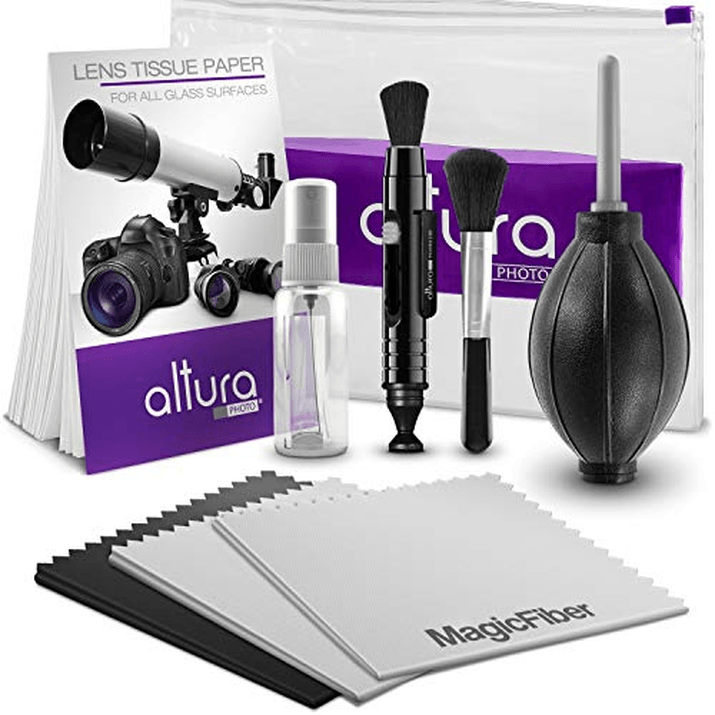
| Brand |
Brand
Altura Photo
|
| Type |
Type
Blower, brush, and wipes
|
| Lens or Sensor |
Lens or Sensor
Lens
|
| Key Features |
Key Features
Lens pen, brushes, blowers, and wipes
|
Of all the types of photography, landscape photography usually involves the greatest risk of your camera getting dirty, wet, or both. Being able to clean your gear regularly or after an incident is important. The Altura Photo Cleaning Kit is a great choice for keeping your lens clean.
There are other options for regular maintenance and cleaning of your camera’s sensor. Here’s our guide to the best camera cleaning kits to help you choose.
The Best Photography Gloves
10. SIMARI Winter Gloves

| Brand |
Brand
SIMARI
|
| Material |
Material
Polyester
|
| Waterproofing |
Waterproofing
Water-resistant
|
| Available Sizes |
Available Sizes
S, M, L, XL, XXL
|
| Key Features |
Key Features
Fleece lining and touchscreen finger point
|
It’s not just your camera that needs protection. You do too! You don’t want to stand around in the cold without gloves. On the other hand, you’ll struggle to operate your camera’s controls if you’re wearing bulky gloves.
That’s where the Simari Winter Gloves come in handy. Warm without being bulky, they will keep your fingers protected. And the touchscreen pads let you operate your touchscreen while wearing the gloves.
If this pair isn’t for you, here’s our list of the best photography gloves.
The Best Spare Batteries
11. BM Premium LP-E6NH Batteries and Charger

| Brand |
Brand
BM Premium
|
| Compatible With |
Compatible With
Canon DLSR and mirrorless cameras
|
| Capacity |
Capacity
2130 mAh
|
Even if you have a camera with great battery life, you’ll want at least one spare battery. The trouble is batteries are not cheap. And cheap batteries might let you down or even damage your camera. Thankfully, trusted brands produce third-party solutions like the BM Premium Version of the LP-E6NH. And it is about a third of the cost of a Canon camera battery.
It even comes as a twin pack with a dual charger. So you can always have one battery in the camera and two charging and ready to go! We’ve compiled a guide to the best third-party camera batteries to figure out which battery is best for you.
Where Can I Find Landscape Photography Inspiration?
Lanscape photography inspiration comes from two places—locations and photographers. There are some truly iconic places to take landscape photos, from Venice to Stonehenge. But the challenge is bringing a fresh look to these places.
When faced with the familiar, it’s time to try new and creative ideas for your landscape photography. This might mean trying a telephoto lens or using high ISOs. Experimenting and learning is the key!
If you think all landscape photography is the same, think again! Here are 21 different types of landscape photography. It’s all about learning the craft. And who better to learn from than Ansel Adams? Adams’ meticulous darkroom practice is beyond most photographers—he would sometimes spend a whole day on one print! But with modern photo editing software, we can dodge and burn like he did in a fraction of the time.
Adams was one photographer who helped to make Yosemite National Park in California, USA a camera magnet. If you’re lucky enough to visit this breathtaking place, we’ve put together a list of location suggestions for you. One of the great things about Yosemite is that it looks great whatever the season.
Every season offers its own challenges and opportunities. Spring photography doesn’t have to be just about melting snow and budding flowers. It might be about rain and city streets.
Autumn offers some of the richest colors. And it is called the “season of mists” for a reason. And fog and mist can be wonderful in your photographs.
And we can’t forget about summer with its blazing sun and deep blue ocean or winter landscapes with their snow and ice.
Landscape photography can be as varied as the landscape itself. The challenge is to capture all the variety. For instance, waterfalls can create stunning photos. The same is true for trees and forests.
One of the beauties of landscape photography is the way the light is so dynamic and changeable. Although photographers have identified particular times of day and given them names—golden hour and blue hour—the truth is that light can change minute by minute.
Of course, the light rarely looks better than during those hours. Taking photos at sunrise and capturing the sunset both seem easy. But there is some skill in taking photos of the sky, and it’s worth learning the ropes.
Some people say that J M W Turner was so good at painting seascapes, that even his landscapes look like they’re moving. The sea can provide the most magical of subjects for landscape photography. And that applies whether you include cliffs and coastlines or simply the beach.
Conclusion—The Best Landscape Photography Gear
Sometimes the landscape presents itself, and all we have to do is grab a phone or camera and snap. But great landscapes can be captured at their best by having the right equipment and learning the right techniques.
You can’t go wrong with choosing any of the products on this list to take your landscape photography to the next level!


